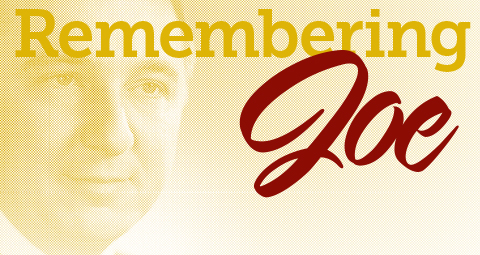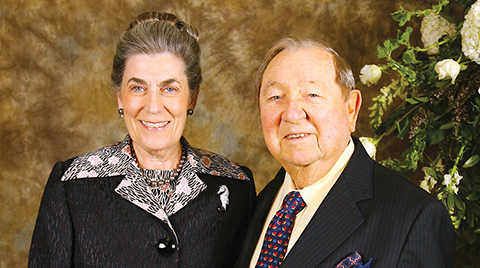Remembering Joe Allbritton
The New York Times headline referred to Joe Allbritton, LLB '49, as a "TV and banking titan" upon his death this winter. (That Allbritton received a NYT obituary should alone tell you something of his prominence.) At Baylor, he was known simply as a friend who gave extraordinarily of his time and resources over the last 60 years to support his alma mater. Below we reprint a celebration of Allbritton's life from Politico.com along with a look at his deep commitment to Baylor.
Joe L. Allbritton, who vaulted from modest means as a young man in post-World War II Texas to become one of the most influential media and financial figures of his generation, died Dec. 12, 2012, in Houston after several months of ill health.
Allbritton made his original fortune in banking, becoming a millionaire by age 33 in a career that brought him friendships with some of the most powerful people in Washington and around the world -- as well as, on occasion, high-profile business controversies.
But it was in the world of media that his career represented a bridge between eras. Roaring into the nation's capital in 1974, he bought and for four years owned The Washington Star, the venerable but financially troubled afternoon daily founded in 1852. In his 80s, he watched as proud observer and informal counselor as his family business launched POLITICO.
Joe Allbritton's only son, Robert Allbritton, 43, is the publisher of POLITICO and the CEO of the privately held media company that owns eight ABC-affiliated television stations in seven markets, including WJLA in Washington.
"Joe was, first and foremost, a beloved and loyal husband, father, grandfather and friend," his family said in a statement. "His life was defined by a love, wit, charm and attentiveness that will be forever cherished by all of us. Joe's life was also one of great achievement, as a businessman, innovator and philanthropist. He was fiercely passionate and unfailingly generous."
Joe Allbritton was born in D'Lo, Miss., on Dec. 29, 1924, the sixth of seven children in a family that soon moved to Houston, where his father owned a small business. After Navy service in World War II, with his law degree in hand from Baylor University, he opened a law practice that very soon gave way to his real interest: the art of the deal.
He was a key member of a generation of Houstonians -- including George H.W. Bush and LBJ aide Jack Valenti -- who leveraged their Texas achievements and connections into outsize Washington careers. Valenti, who died in 2007, was one of Allbritton's closest friends; the 41st president was a regular at the annual brunch Allbritton and his wife, Barbara, held at their Washington home on the morning after the Alfalfa dinner, an exclusive gathering of top business and political leaders.
Although he rarely gave interviews, and often gave charitable gifts anonymously to avoid publicity, Allbritton clearly relished the entree success gave him into the worlds of business, power and even celebrity. Among his friends late in life was Britain's Prince Charles, whose charitable work the Allbrittons supported.
Former First Lady Nancy Reagan called Allbritton "a truly remarkable man."
"He did so much for so many worthy causes across our country and beyond our shores," she said in a statement. "Ronnie and I considered Joe and his wife, Barby, to be dear friends and I will miss his great sense of humor."
Friends and business associates described Allbritton as having an uncommon gift for making numbers come alive in his imagination -- to look at a business and judge cost, debt, cash flow and potential for growth in order to seize opportunities that others didn't perceive.
In this sense, Allbritton's career presaged the investment bankers and buyout specialists common in today's marketplace. But Allbritton's interest was usually in owning businesses for the long term, rather than flipping them for a profitable resale.
Allbritton's business prowess led to controlling stakes in Texas banks, insurance companies, a chain of funeral homes, assorted media properties and, most famously, the storied Riggs Bank in Washington, the target of a successful hostile takeover.
Riggs was sold in 2005 to the larger PNC Financial Services Group after the company was forced to pay millions of dollars in fines related to its dealings with a number of foreign interests, including Chilean strongman Augusto Pinochet. The PNC sale brought Allbritton a large financial sum but the loss of the historic Riggs name -- its slogan boasted that it was "the most important bank in the most important city in the world" -- remained a source of regret for Allbritton, associates said.
In his final years, Allbritton's pride came largely from succeeding generations. He would wear POLITICO baseball caps and T-shirts while playing with his grandchildren. Sometimes, he would quiz executives at the company on business and editorial matters, sometimes pretending caustically to second-guess their decisions. It took the publisher, adept at reading his father's sense of humor, to assure people that he was just kidding; his main involvement in the new publication was as cheerleader. As his eyesight failed in recent years, he would have people read the latest news to him.
He was a genial and easygoing presence in a way that -- as an intensely competitive businessman and no-nonsense manager -- was not always the side he presented as a younger man.
But he was always someone who relished the prizes of his success. He owned homes in the District, Houston and La Jolla, Calif. He was a serious art collector, owning works by Van Gogh, Monet and Matisse. His Lazy Lane Farm in Upperville, Va., is the home of Hansel, who won two legs of the Triple Crown in 1991.
Deer shot at the Lazy Lane estate would wind up in the venison chili served at the annual Alfalfa brunch. At these gatherings, a bipartisan crowd would include people such as Colin Powell and James Baker, Donna Shalala and Vernon Jordan, with the world of business represented by the likes of Eric Schmidt of Google and Paul Otellini of Intel.
Joe Allbritton, for all his riches, was shaped in lasting ways by the Great Depression. During the 1930s, D'Lo lost its sawmill and its major source of employment closed. The Allbritton family headed west and settled in Houston.
His father opened a sandwich shop downtown called the Allbritton Cafe. It eventually grew into a chain of cafeterias, and Allbritton washed dishes at the family business as a teen.
He served in the Navy from 1943 to 1946; after World War II, Allbritton finished college and earned his degree from Baylor, where he was a championship debater.
After graduation, he bought and sold land during a real estate boom, then used the profits to invest in banks and insurance companies. In 1956, he organized the San Jacinto Savings & Loan. In 1961, he bought 45 percent of Citizens Bank and Trust for about $2.5 million. He took control of the Houston Bank & Trust in the 1960s. He earned plaudits for turning around struggling financial institutions.
At 42, in February 1967, he married Barbara Balfanz, who goes by Barby. Robert Allbritton was born in 1969.
As his financial empire grew, Allbritton branched out into media. He bought the struggling Washington Star for $35 million in 1974, his first foothold in the region. As publisher of the Star, he won major labor concessions that allowed the paper to become profitable.
Katharine Graham, the late publisher of The Washington Post, recalled Allbritton as "a brilliant deal-maker" and Southern gentleman in her 1997 memoir, which chronicles her competitive battles with the Star during the years he controlled it.
"Joe had brains and great charm as well," she wrote. "Joe was a rival to be respected and feared, but I tried to and did remain on friendly terms with him. I wrote a friend, 'Joe is the best thing that could have happened... I know he is able, dedicated, and decent.'"
In 1978, Allbritton sold the Star to Time Inc. for $20 million. FCC rules limited how many media properties one could own in the Washington market, and Allbritton said he had to choose between the newspaper and his beloved holding in television. The Star closed three years later.
He held onto Channel 7 in the D.C. media market, which he renamed WMAL to WJLA -- his initials.
Elsewhere, he stayed active as a newspaperman. In 1981, he acquired the Trenton Times in New Jersey from The Washington Post Co. In 1982, he reached a tentative deal to buy the New York Daily News, then the nation's largest daily circulation newspaper. It was contingent on union concessions that the workers would not agree to, so the deal fell apart.
In a 1982 profile, The New York Times wrote: "His enemies call him ruthless and his admirers call him tough, but there is little disagreement on one point: Joe L. Allbritton is the archetype of a self-made man. ... His brashness contrasts sharply with the conservative self-assurance of many corporate executives, and seems to put him out of place in sedate board rooms."
The Washington Business Journal once described Allbritton as "a Texan with a Washington footprint big enough to rival the Lone Star State." Gibson Gayle, a friend and Houston lawyer, told the Post in 2004 that Allbritton "could charm the rattles off the back end of a rattlesnake."
Allbritton will perhaps be most remembered for his two decades at the helm of Riggs Bank, which he won control of in 1981 after a hostile takeover and legal fights with the board. The bank was the largest in the region at the time and a Washington institution.
He worked his way onto the Forbes 400 list of the country's richest people. A 1981 filing said he was worth, conservatively, about $200 million.
In 1985, he led an ultimately unsuccessful effort to bring baseball back to Washington.
His banking empire nearly went under in the early 1990s during a collapse in the real estate market, but he saved it by infusing his family's own capital. He also slashed his own salary and the Riggs dividend.
In 1991, he sold the Pierce Brothers funeral homes business he owned for more than $100 million. In 1992, he sold Pierce National Life Insurance Co. in Los Angeles for $45 million. He had acquired both in the 1950s.
Allbritton believed in the idea of innovation. In 1991, he launched NewsChannel 8 in the Washington market. It was a pioneering effort to do for a local market what Ted Turner did for CNN nationally. The channel continues to function to this day.
He kept a relatively low profile in his later years, especially after being diagnosed with prostate cancer in 2000. Robert Allbritton took control of Allbritton Communications in 1998 and Riggs Bank in 2001. Joe Allbritton left the bank's board in May 2004.
Allbritton was a civic-minded philanthropist, serving on the Baylor Board of Regents from 1989 to 2001 and as a trustee of The Lyndon Baines Johnson Foundation, The Ronald Reagan Presidential Foundation and The George Bush Presidential Library Foundation.
Through the Allbritton Foundation, he supported Baylor Medical School, the Allbritton Art Institute and the Oxford Scholars. He helped fund the establishment of the International School of Law, which became the George Mason Law School in Virginia.
He sat on the boards of the John F. Kennedy Center for the Performing Arts and the Museum of Fine Arts in Houston. He donated the official White House portrait of Reagan.
Allbritton is survived by his wife, Barbara, and son, Robert. He has two grandchildren, Alex and Katherine.
This story has undergone minor edits for length and style from an original version by John F. Harris and James Hohmann that ran on Politico.com on Dec. 12, 2012. Reprinted with permission.

